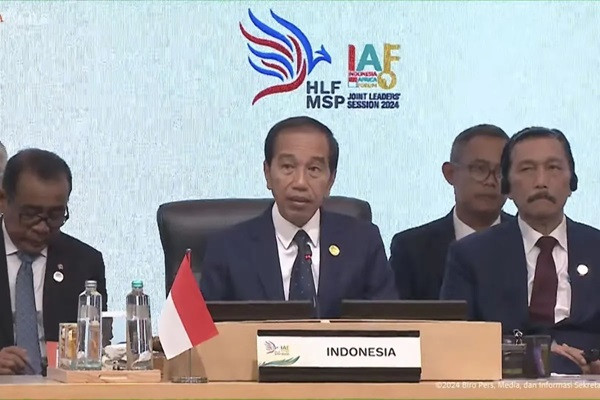Popular Reads
Top Results
Can't find what you're looking for?
View all search resultsPopular Reads
Top Results
Can't find what you're looking for?
View all search resultsPartnership for prosperity between Indonesia and Africa
The newly enacted AfCFTA presents unprecedented potentials as one of the most progressive trade agreements globally, enhancing access to a Pan-African market encompassing 54 countries with a combined GDP of US$3.4 trillion.
Change text size
Gift Premium Articles
to Anyone
P
resident Joko “Jokowi” Widodo opened on Monday the second Indonesia-Africa Forum in Bali. The forum brought together the world's fourth-most populous and largest Muslim-majority nation with a continent of 1.3 billion people.
Hosted by the Foreign Ministry, the summit lays the foundation for mutual economic growth in the 21st century through investment in high-potential sectors, such as technology, infrastructure, electric battery production, agribusiness, education and health care. Ongoing and future partnerships could significantly boost the growth and economic performance of both Africa and Indonesia.
One of the most significant opportunities has resulted from the formation of the world’s largest free trade area: the African Continental Free Trade Area (AfCFTA), which stretches from Cape Town to Cairo and from Accra to Antananarivo and encompasses 54 countries with a combined GDP of US$3.4 trillion.
The AfCFTA is one of the most progressive trade agreements globally and will enhance market access to the Pan-African market.
The agreement includes advanced protocols on trade in goods, services, digital products, competition, intellectual property and investment. Its recently concluded digital trade protocol opens up opportunities for investment in technology, e-commerce and AI.
Additionally, the AfCFTA features a legally binding dispute settlement mechanism, similar to that of the European Union, which is crucial for establishing a level playing field. Commitments to streamline and harmonize trade regulations, known as trade facilitation, further support the agreement.
Africa is a burgeoning market with a projected quarter of the world’s consumers by 2050. The AfCFTA opens up opportunities for increased domestic and foreign investment in some of the world’s fastest-growing economies and sectors.
The agreement will foster trade within and from Africa and support the continent’s structural transformation by encouraging industrialization and export diversification. These changes will drive job creation, investment and economic prosperity for millions across Africa.
The United Nations Economic Commission for Africa (UNECA) estimates that full implementation of the AfCFTA could boost annual GDP growth rates by up to 2 percent, increase intra-African trade by 52 percent and create 10 to 15 million jobs. Most income gains are expected from trade facilitation measures that simplify trade and customs procedures, at $300 billion of a projected $450 billion.
These impacts highlight the potential for trade growth to be a powerful transformative force in driving Africa’s partnership with Indonesia.
The liberalization of tariffs and the reduction of nontariff barriers (NTBs) will boost international and cross-border investment and lower entry barriers across countries, significantly enhancing real income gains. In the first phase of AfCFTA implementation, countries will eliminate tariffs on 90 percent of goods and reduce NTBs on goods and services, easing trade across borders.
Foreign direct investment (FDI) inflows attracted to the AfCFTA will not only enhance local expertise and jobs, but also forge connections that can help African firms join regional and global value chains. Evidence shows that African countries with larger markets and fewer trade barriers already attract more FDI, indicating the AfCFTA’s potential to increase FDI inflows.
With deep integration under the agreement, total export volumes are projected to increase by 32 percent by 2035.
And while the AfCFTA’s ratification represents a massive opportunity to drive growth through trade and investment, the challenge lies in its implementation. Reducing tariffs through the AfCFTA is an essential step forward, but the key to unlocking gains from the agreement lies in removing pernicious trade facilitation and infrastructure barriers.
Political commitment to moving forward solutions to these challenges is positive, and significant progress is likely with support from partners like Indonesia.
Interregional cooperation can be the solution to tackling these challenges. Indonesia understands Africa’s potential and is eager to forge partnerships to help overcome the barriers and realize these gains, driven by trade, investment, growth and economic opportunities, much like its own successful development journey to achieving middle-income status within ASEAN.
Indonesia has expertise in critical sectors that Africa needs and has demonstrated how trade can be harnessed for growth.
Through strong political leadership backed by the willingness to cooperate and learn across continental boundaries, countries can do more together and drive progressive and transformational change.
***
Rishon Chimboza is managing director for Africa at the Tony Blair Institute for Global Change, where Jalil Rasheed is managing director for Asia Pacific, Frank Matsaert is global lead for trade and infrastructure and Shuhaela Haqim is Indonesia country director.










